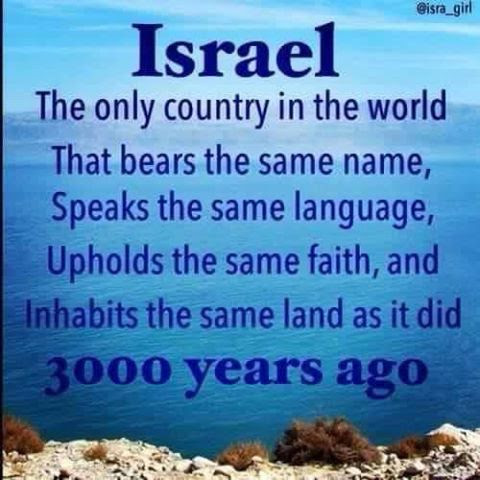The West fears Islamic aggression (which has been going on since WW1), and is opting for appeasement. Propaganda is being used to try to convince people that Muslims in Israel, and in the Gaza Strip, West Bank, and Golan Heights, are being mistreated. Islamist forces have conducted maneuvers at the borders of Israel, and have continuously lobbed missiles into Israel. Islam constantly threatens Israel, often using language that proclaims a desire for the complete destruction of Israel. The Arab-Palestinians have spoken to the world, proclaiming parts of Israel to belong to them.
Peace in the Middle East is desired at any cost by the Western Appeasers. The unrest is being blamed on Israel. Islam promises that the Arab-Palestinian claims are the last they will make in Israel. If land is traded for peace, they say, then the unrest in the Middle East will ease, which is a delusion and not reality.
The Western Leaders, fearful that if the Muslims are not appeased the world could plunge into terrorism (which it has already and increasing daily), have decided they need to negotiate with the Arab-Palestinians, grant them the Statehood they suddenly desire, and grant them their demands for the purpose of a delusional peace.
As The West prepares for appeasement, the forces of jihadism are on the rise in Egypt, Syria, Turkey and Iran and extends to Pakistan, Afghanistan and former Russian states. Egypt's peace with Israel has been guaranteed by U.S. involvement, and land for peace. The treaty with Egypt was based on the proposition of the Sinai in 1982 for peace. The Islamists moving into position to gain power in Egypt places the treaty at risk. They have no intention of abiding by its provisions.
The concept of land for peace has failed, as it failed prior to WW2. Islamism does not care about land. Islamism only cares about the destruction of Israel, the destruction of non-Islamic societies, and ultimately the worldwide domination of Islam through a Muslim caliphate.
Israel gives land because they want the Arabs to abide by peace agreements. Israel craves peace, but deep down knows that it is not possible. Islam has made it loud and clear that land for peace is a one way street. Israeli land giveaways are permanent, but Islamic commitments to peace are revoked at any time.
With the current presidential administration in the United States, and the liberal socialists in control of the U.N. and Europe, Israel stands alone. No one plans to stand up for Israel's right to exist, as history has proven, the Jewish people have ultimately been abandoned by the world nations. The Muslim Brotherhood and Salafist parties are working to take an absolute majority in Egypt and other Muslim countries, but The West has fallen for the propaganda that claims these parties are moderate and pragmatic. ISIS has proven that this approach is wrong and detrimental to peaceful coexistence.
The fact is, the rising Islamist control over the Muslim nations has no intention of respecting treaties, or Israel's right to exist. They are waiting for conflict, and then will blame it on Israel. Talks are doomed to failure. The Islamists want it that way or the highway.
Land for Peace fails. Liberalism fails. Only a strong and direct military posture with no-holds-barred that stands up against the rising threat will succeed. . . but the appeasers refuse to learn from history, and like Neville Chamberlain with Germany, Barack Obama and his fellow appeasers are positioning the world for a new world conflict that could turn the world to ashes.
A viable solution for the conflict is: Two States - Greater Israel for the Jewish people as guaranteed by International law and treaties after WW1 and Jordan that was originally part of the territory allocated to the Jewish people under 1920 international treaties, thus Jordan has 75% of its people are Arab-Palestinians and the 120,440 sq. km. or 75,000 sq. mi. (5-6 times the size of Israel) the Arab countries confiscated from the million plus Jewish families they persecuted and expelled from Arab countries and confiscated all their assets, businesses, homes and Real estate property valued in the trillions of dollars. That should settle the refugee problem once and for all. But the Arabs will not be satisfied until they get all of Israel without the Jews and they do not hide their intention.
YJ Draiman.
| |||||||||||||||||||||||||||||||||||||||||||||||||||||||||||||||||||||||||||||||||||||||||||||||||||||||||||
| |||||||||||||||||||||||||||||||||||||||||||||||||||||||||||||||||||||||||||||||||||||||||||||||||||||||||||







.png)
